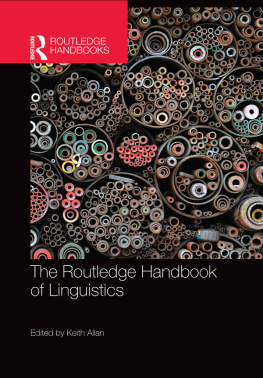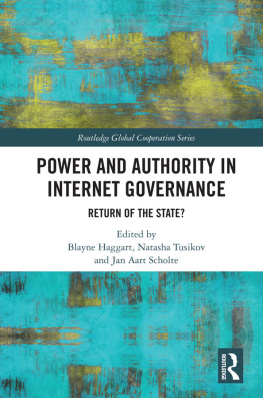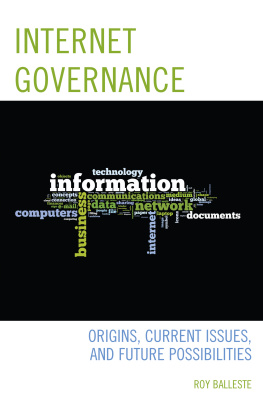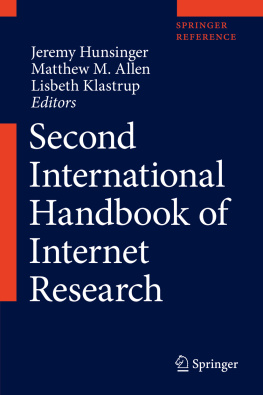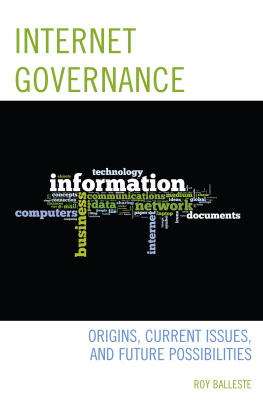THE OXFORD HANDBOOK OF
INTERNET STUDIES
THE OXFORD HANDBOOK OF
INTERNET STUDIES
Edited by
WILLIAM H. DUTTON


Great Clarendon Street, Oxford, OX2 6DP,
United Kingdom
Oxford University Press is a department of the University of Oxford.
It furthers the Universitys objective of excellence in research, scholarship,
and education by publishing worldwide. Oxford is a registered trade mark of
Oxford University Press in the UK and in certain other countries
Oxford University Press 2013
The moral rights of the author have been asserted
First Edition published in 2013
Impression: 1
All rights reserved. No part of this publication may be reproduced, stored in
a retrieval system, or transmitted, in any form or by any means, without the
prior permission in writing of Oxford University Press, or as expressly permitted
by law, by licence or under terms agreed with the appropriate reprographics
rights organization. Enquiries concerning reproduction outside the scope of the
above should be sent to the Rights Department, Oxford University Press, at the
address above
You must not circulate this work in any other form
and you must impose this same condition on any acquirer
British Library Cataloguing in Publication Data
Data available
ISBN 9780199589074
Printed in Great Britain by
MPG Books Group, Bodmin and Kings Lynn
PREFACE
Internet Studies is one of the most rapidly developing interdisciplinary fields of the early twenty-first century. With the increasing significance of the Internet, and the range of issues surrounding its use and governance, the field is on a course to continue expanding in its range and diversity through the coming decades. Despite the pace of change, it is a time to take stock of this emerging field, examine current approaches to study of the Internet, and reflect on the fields future. This was the key motivation behind this handbook.
The Oxford Handbook of Internet Studies has been designed to provide a valuable resource for students and scholars of Internet Studies. It brings together leading scholarly perspectives on how the Internet has been studied, coupled with views of how Internet Studies should be pursued over the coming years. These perspectives should help strengthen research and identify the big questions for the field to pursue.
However, the promise of Internet Studies extends beyond the field itself. The development of this field has the potential to shape research, policy, and practice across the allied disciplines and not simply within the field of Internet Studies. It is in this sense that one of the key themes of this handbook is the transformative potential of Internet Studies, not only in establishing a new field of study, but also in changing research across the social sciences and related disciplines, as more social research is driven to consider the role of the Internet and related information and communication technologies within their own orbits of inquiry.
In this spirit, a necessary aim of this handbook has been to focus on Internet Studies as an emerging field, rather than provide a collection of studies of the social implications of the Internet. Each author has been asked to provide a synthesis and critical assessment of research in their particular area of expertise. The assembled chapters cover a broad spectrum of topics, including social science perspectives on the technology of the Internet, the role of the Internet in everyday life and work, implications for communication, power, and influence, and the governance and regulation of the Internet. Taken together, the authors represent the increasingly international range of scholarship that is building in the field, as well as the contribution of young, along with more established scholars. You will find that a number of chapters have senior academics working with their graduate students, many of whom are among the new generation of scholars who have focused on the Internet during their graduate training.
Given the enormous scope of the field, I had to be selective in sampling some of the most critical topics and issues confronting research in this area of inquiry. Taken together, the chapters seek to convey the broad scope of Internet Studies, centered primarily within the social sciences. The chapter authors have not hesitated to span disciplinary boundaries, and together they ensure a multidisciplinary perspective on the study of the Internet.
The scope of Internet Studies is potentially vast and is defined broadly for this volume. As editor, I wanted to keep a broad definition of Internet Studies, and the Internet as a network of networks that includes related media, information, and communication technologies. Of course, the book also seeks to address controversies over the scope of Internet Studies and related fields, such as Web Science and New Media Studies, which propose different boundaries for their own and related fields. However, as editor of this handbook, and a long time researcher within the field, I was convinced that a broad definition of Internet Studies should incorporate many aspects of these related areas of research and teaching.
The Internet and its study are moving at such a rapid pace that many colleagues doubted whether any book could provide a definitive definition of the field. You will find in the chapters of this handbook that the pace of technical and social change is an issue that most authors are grappling with. The field cannot wait for change to slow down, however, before we sketch the developing scope and methods of a field. All students of Internet Studies are doing research on moving objects of analysis. It is nevertheless possible to capture this and other aspects of Internet Studies, and provide a meaningful framework for understanding the scope of the field. In the course of doing so, I hope this book provides a key reference on the nature of Internet Studies of value to contemporary students and scholars that will remain a basis for scholars to judge the progress of the field for years into the future.
This is not the only handbook on Internet Studies; in fact, a number have appeared in the years preceding this collection. In my view, this is one of many signs that this field is maturing and beginning to reflect on its history and future. I hope this book complements other handbooks and helps continue the progress of one of the most vibrant and significant fields of new scholarship in the twenty-first century.
William H. Dutton
Oxford, England
November 2012
ACKNOWLEDGMENTS
I am grateful to many colleagues for their support, advice, and comments on particular chapters and the structure of the book as a whole.
As Professor of Internet Studies at the Oxford Internet Institute (OII), and its founding Director from 2002 to 2011, I benefited greatly from the insights of my students and colleagues, all of whom are pushing forward on the leading edge of Internet Studies. Whether in our Summer Doctoral Programme or Advisory Board meetings, my colleagues have engaged me in a continuing dialogue about the nature and future of Internet Studies, and what we have called the social science of the Internet. OII faculty, students, advisors, and visitors could not know how much I have valued and learned from our day-to-day conversations and debates, and our courses, seminars, and many series of lectures. This extends beyond our department, to my colleagues from other departments and the many colleges across this collegiate University of Oxford. A tremendous virtue of Oxford is an academic culture that resists specialization and nurtures the inter-disciplinary exchange that informs this book. It has been the enthusiasm around the social issues of the Internet, from an interdisciplinary range of Oxford colleagues that has continued to boost my commitment to better understanding the history and future of this field.
Next page

